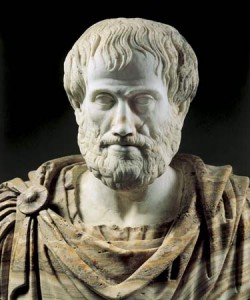You can’t study public speaking without studying the classics. Many consider the Greek philosopher, Aristotle, to be the father of rhetoric (the art of public speaking).

- ARISTOTLE
He wasn’t the only classical scholar with something to say about communication, however. Here are some of my favorite Latin quips:
“Magna res est vocis et silentii temperamentum.” (The great thing to know is when to speak and when to keep quiet.) – Seneca the Younger
“Stultiop stulto fuisti, que tabellis crederes.” (Idiot of idiots to trust what is written.) – Plautus (In other words, don’t trust everything you read!)
“Fortis fortuna a diuvat.” (Fortune favors the brave.) -Terence (ok, ok, so he wasn’t specifically talking about public speakers, but it still applies!)
“Oratorem te puta, si tibi ipsi quod oportet persuaseris” (Consider yourselve a great orator if you can talk yourself into unpleasant duties) -Syrus
“Brevis esse laboro obscurus fio.” (When I try to be brief, I speak gobbledegook) -Horace (this is why it’s easier to be a lecturer than a speech student!)
“Quicquid bene dictum, est ab ullo meum est.” (If it’s well said, I said it.) – Seneca the Younger (I wish I’d said that!)
Mandare quequam litteris cogitationes suas, qui eas nec disponere nec illustrare possit nec delectatione aliqua adlicere lectorem, hominis est intemperanter abutentis et otio et litteris.” (To write without clarity and charm is a miserable waste of time and ink) -Cicero (And to speak without clarity and charm is a miserable waste of time and breath!)